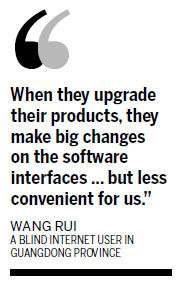Software urged to be friendly for the blind
Updated: 2012-11-06 09:14
By He Dan (China Daily)
|
||||||||
Popular domestic software programs are not user-friendly for blind people due to their developers' ignorance about the needs of residents with visual impairments, activists said.
Even with the help of Screen Reader, a software application that allows the visually impaired to surf the Internet by identifying and interpreting what is being displayed on the screen, blind people still found the software difficult to use, activists who promote information barrier-free rights for the blind said in a report.
These applications include Internet security product 360 Safeguard, download manager Xunlei Thunder and Sogou typewriting tool among the 10 most widely used programs in China.
|
 |
Sun Tao, an initiator of the report from Qingdao in East China's Shandong province, said he has yet to receive feedback from any of the developers of these 10 software titles after he sent the results to them on Oct 23.
The report is based on an online poll of a total of 100 netizens with varying degrees of visual impairments from 24 provinces and municipalities.
More than 60 of these respondents said they are not happy with the 10 programs in terms of their accessibility for the blind. Not a single respondent felt "very satisfied" with these software programs, the report said.
"Online surfing is becoming more and more inconvenient (for the visually impaired group)," said Li Bo, a blind resident in Southwest China's Chongqing Municipality who started using computers in high school.
"For example, I failed to install the latest version of Xunlei Thunder because it doesn't have audio guidance. And even when I installed the program with help from someone else, I cannot use its main functions because my screen-reading browser cannot read it," he added.
Wang Rui, a blind resident from South China's Guangdong province, said that many domestic software developers care little about accessibility for the blind.
"When they upgrade their products, they make big changes on the software interfaces to make them look more beautiful but less convenient for us," he said.
Like Li and Wang, China has 40,000 to 50,000 blind people who can surf the Internet with the help of screen readers.
Statistics also showed that the number of potential blind Web users is huge as there are more than 12.3 million visually impaired people across China, among which 5 million are totally blind.
But some domestic developers have simply ignored the specific needs of the disadvantaged group.
Xu Wei, a marketing manager for Shenzhen-based Xunlei Networking Technologies, which developed Xunlei Thunder, said he didn't know that blind people can surf the Internet by using screen readers.
He said the issue of information barrier-free rights for people with special needs is worthy of discussion and concern among the society.
Sogou.com Inc, whose typewriting products registered more than 300 million users in China, said in an e-mail interview that the company took account of users' differences in habits and cognitive disparities when designing its typewriting software.
But the company was quick to add that challenges remain in software development as it takes great patience and extra energy for software writers to include keyboard and verbal input in programming.
Cao Jun, who heads a screen-reading design company in Beijing, said the poor performance of domestic software developers in terms of barrier-free rights for the blind is not due to limitation in techniques.
"The real reason is that they chose to ignore or betray the basic principles and requirements for barrier-free design," he said.
Huang Yizhi, a lawyer focusing on protecting the rights of people with disabilities, said developers' poor consideration of social responsibility is due to the weak enforcement of existing laws.
"We have laws and regulations that articulate that guaranteeing information barrier-free is the duty of the government and society, but we cannot find any law article for do's and don'ts for software design," he said.
Activists urged the government to speed up designing information barrier-free guidance for software developers.
They also called for software developers to invite people with visual disabilities to test their products before releasing them.
hedan@chinadaily.com.cn

 Relief reaches isolated village
Relief reaches isolated village
 Rainfall poses new threats to quake-hit region
Rainfall poses new threats to quake-hit region
 Funerals begin for Boston bombing victims
Funerals begin for Boston bombing victims
 Quake takeaway from China's Air Force
Quake takeaway from China's Air Force
 Obama celebrates young inventors at science fair
Obama celebrates young inventors at science fair
 Earth Day marked around the world
Earth Day marked around the world
 Volunteer team helping students find sense of normalcy
Volunteer team helping students find sense of normalcy
 Ethnic groups quick to join rescue efforts
Ethnic groups quick to join rescue efforts
Most Viewed
Editor's Picks

|

|

|

|

|

|
Today's Top News
Health new priority for quake zone
Xi meets US top military officer
Japan's boats driven out of Diaoyu
China mulls online shopping legislation
Bird flu death toll rises to 22
Putin appoints new ambassador to China
Japanese ships blocked from Diaoyu Islands
Inspired by Guan, more Chinese pick up golf
US Weekly

|

|






